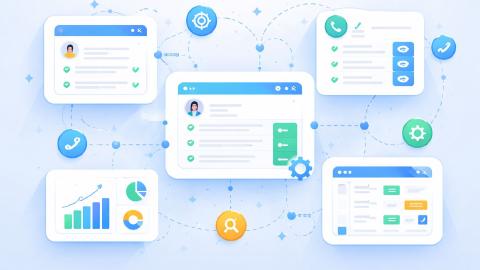20 Study Tips & Hacks for Your Academic Comeback in 2026
Use these study tips and hacks to study smarter and get better grades in 2026.
Getting back into study mode can be tough after a break. Many students struggle to stay focused, manage their time, or find study methods that actually work.
With new study tools, smarter techniques, and better habits, it's easier than ever to develop skills that can help you turn things around this semester.
In this guide, we'll cover 20 practical study tips and study hacks to help you study effectively in 2026 and make your academic comeback strong. Let's dive in!
How Do I Study Effectively?
Studying effectively starts with building the right habits and skills, and that takes time. It’s a slow process that improves as you learn what works best for you.
The goal isn’t to study harder but to study smarter by focusing on consistent improvement.
A few core principles include managing your time well, finding a study method or technique that fits your learning style, and limiting distractions to stay focused.
When you combine these habits with tools that help you stay organized and review smarter, studying becomes much more manageable.
How to Start Developing Study Skills that Work
Developing strong study skills takes time and intention. The key is to build habits that help you stay consistent and focused over the long term.
Here are some general steps you can follow:
Set clear academic goals and track your progress weekly.
Create a dedicated study schedule and stick to it.
Identify your preferred learning methods (visual, auditory, or written).
Break large tasks into smaller, manageable steps.
Review your notes regularly instead of cramming.
Reflect on what strategies help you retain information best.
Over time, these small habits turn into a personalized system that supports your success every semester.
Use AI Blaze to study better with AI for FREE.
20 Study Tips for Studying Effectively in 2026
These study tips cover a wide range of methods and techniques that can help you learn more efficiently and stay motivated. Each approach works differently, so the key is to implement them carefully and intentionally.
Our suggestion: focus on consistency over perfection. Experimenting with these tips will help you find what works best for your learning style and goals.
Here's our top 20 study tips and hacks for studying effectively in 2026:
1. Manage Your Time Wisely
Time management helps you stay organized and avoid last-minute stress. It works because breaking down large tasks into smaller chunks makes studying feel less overwhelming.
Start by creating a weekly schedule that includes study sessions, breaks, and rest time. Use tools like Google Calendar or Notion to track your progress.
Make sure to adjust your plan when needed instead of forcing yourself into a rigid routine. Over time, you’ll learn how long each subject takes and can plan your days more effectively.
2. Use the Pomodoro Technique
The Pomodoro technique improves focus by splitting your study time into short, focused intervals. It works by helping you manage mental fatigue while keeping your brain engaged.
To use it:
- set a timer for 25 minutes of studying
- follow it with a 5-minute break
- after four rounds, take a longer 15–30-minute break to recharge
Try using free Pomodoro apps or browser timers to stay on track. This method helps you stay productive without burning out.
3. Apply the Feynman Technique
The Feynman technique helps you understand complex topics by explaining them in your own words. It works because teaching forces you to simplify and clarify your thoughts.
To try it, pick a concept and explain it as if you were teaching it to a friend. When you get stuck, revisit your notes to fill in the gaps. Writing your explanation out loud or on paper can also make learning more active.
This technique is especially useful for science and technical subjects.
4. Try Rote Memorization for Key Facts
Rote memorization helps with remembering straightforward information like definitions, equations, or vocabulary. It works by strengthening recall through repetition.
Rote memorization is the process of learning information through repetition until it can be recalled automatically. It focuses on memorizing facts or data rather than understanding the deeper meaning behind them.
To use rote memorization effectively, focus on short, frequent review sessions instead of long, tiring ones. Pair this with active recall by testing yourself after each review.
Flashcards or digital tools like Quizlet can help reinforce memory. Use this method for foundational knowledge that supports deeper understanding later.
5. Use Spaced Repetition and the Leitner System
Spaced repetition improves long-term retention by reviewing material at increasing intervals. The Leitner system supports this by focusing on what you struggle with the most.
To use it, organize flashcards into groups based on how well you know each one. Review difficult cards more often and move easier ones to later review sessions.
There are plenty of study tools that can automate this process. This method helps you learn efficiently without wasting time on material you already know.
6. Follow the SQ3R Method
The SQ3R method makes reading and remembering easier by turning it into an active process.
SQ3R stands for Survey, Question, Read, Recite, and Review.
It works because it forces you to think critically instead of passively reading. Start by skimming the text, forming questions, and then reading to find answers.
Summarize key points in your own words and revisit them later. This approach is great for dense material like textbooks or research papers.
7. Use AI Study Tools and Helpers
AI tools can help you simplify complex information and organize your study material. They work by breaking down large topics into smaller, clearer summaries that are easier to review.
If you are looking for an AI tool or study helper, look no further than AI Blaze.
AI Blaze is your personal AI studying & writing assistant that helps you quickly generate study guides, take notes, answer questions, solve problems, and much more!
With AI Blaze, you can use AI to generate study guides based on your textbook, syllabus, or any other course materials in just a few seconds! Plus, it works on any website!
Here's how AI Blaze can help you:
Generate study guides with AI - Quickly generate study guides on any website to help you study.
Create practice tests & check your answers - AI Blaze can even help you study by generating practice tests, grading your answers, and providing feedback!
Get help with homework with an AI tutor - AI Blaze can answer any homework question and explain it to you to help you learn.
Create flashcards & take notes - AI Blaze can help you create flashcards and generate notes for you in seconds.
By the way, AI Blaze is free for students! Get started and study smarter with AI Blaze for free!
Use AI Blaze to study better with AI for FREE.
8. Minimize Distractions
Minimizing distractions keeps your focus on the task at hand. It works because multitasking reduces comprehension and slows learning.
Start by studying in a quiet space with minimal background noise. Use focus apps like Forest or Freedom to block distracting sites during study time. Silence notifications and clear clutter from your desk.
Training your brain to focus in short bursts builds stronger concentration over time.
9. Take Effective Notes
Effective note-taking helps you process and retain information as you learn. It works because organizing material in your own words reinforces memory and understanding.
Here are some tips for taking effective notes:
Try using structured methods like the Cornell system or digital apps to help you with note-taking.
Write summaries instead of copying text verbatim.
Use bullet points, headings, and color-coding to highlight key points.
Regularly reviewing your notes makes studying for exams much easier later.
10. Use Active Recall
Active recall strengthens your memory by forcing your brain to retrieve information without prompts. It works because the effort of recalling helps build stronger neural connections.
To practice, close your notes and try explaining what you remember aloud or on paper. Quiz yourself using flashcards or question lists. Review your mistakes and focus on improving weak areas.
Utilizing active recall consistently will help you remember information long-term.
11. Study for Exams Early
Starting early gives you enough time to review and fill gaps in your understanding. It works by reducing stress and preventing last-minute cramming.
Begin preparing at least two weeks before each exam. Create a schedule that breaks down what to review each day. Focus on weaker subjects first and save confident areas for quick review later.
Early preparation makes exam season more manageable and less overwhelming.
12. Plan for SAT and ACT Tests
Preparing for standardized tests like the SAT or ACT requires structure and repetition. It works because consistent practice builds familiarity with the format and timing.
Start by taking a diagnostic test to identify your strengths and weaknesses. Use official prep materials or online platforms to track progress. Schedule specific study blocks for each section — reading, writing, and math. Reviewing errors carefully helps you improve faster.
13. Build a Study Routine in College
Having a steady routine in college keeps your studies balanced with other responsibilities. It works because regular habits reduce decision fatigue and increase consistency.
Pick specific times each day dedicated to studying. Create a comfortable, distraction-free environment where you can focus.
Include both solo and group study sessions for variety. A clear structure makes managing assignments and exams easier throughout the semester.
14. Build a Consistent Routine While Studying Abroad
Studying abroad can make it hard to stay organized with new schedules and environments. Building a consistent study routine works because it keeps you grounded and helps balance school with travel and social life.
Set fixed times each day or week for studying, even if your class schedule changes. Use online tools like AI Blaze to review materials or summarize notes from anywhere in the world.
Find quiet, reliable study spots like libraries or cafés to stay focused. A simple routine helps you enjoy your experience without falling behind academically.
15. Create Visual Study Aids
Visual study aids help turn complex topics into simple visuals your brain can easily remember. It works by using your visual memory to create stronger mental connections.
For example, you can:
Draw mind maps, flowcharts, or diagrams for subjects that involve processes or relationships.
Use digital tools like Canva or Notion for clean layouts.
Review your visuals regularly and update them as you learn more. This approach works especially well for science or history subjects.
Use AI Blaze to study better with AI for FREE.
16. Use the 2x Rule for Better Retention
The 2x Rule means spending twice as much time reviewing material as you did learning it the first time. It works because revisiting content strengthens memory and helps you catch what you missed earlier.
After a lecture or study session, schedule a review within 24 hours, then again later in the week. Use those sessions to test yourself, not just reread notes.
Combining this rule with spaced repetition can dramatically improve long-term recall. It’s a simple formula that helps you retain what you study without cramming.
17. Stay Organized Digitally
Staying digitally organized saves time and prevents frustration when deadlines pile up. It works by helping you access what you need without wasting effort searching.
Use folders and naming systems for documents, notes, and resources. Store files in the cloud so you can study from anywhere. Keep your desktop and email tidy to reduce mental clutter.
Consistency in organization keeps your workflow smooth and efficient.
18. Try Study Hacks for ADHD
Study hacks for ADHD focus on structure and stimulation. They work by helping you maintain focus and motivation despite short attention spans.
Break tasks into small, time-limited chunks using timers. Add movement or background sounds that keep you alert. Use tools to organize thoughts, summarize notes, or build quick study plans.
The key is finding what helps you stay engaged without overwhelming yourself.
19. Use Case-Based Learning for Nursing Students
Case-based learning helps nursing students apply theory to real clinical situations. It works because it builds problem-solving skills and reinforces memory through practical examples.
Start by turning lecture notes into short patient scenarios and challenge yourself to identify possible diagnoses or care plans. Study with classmates to discuss different approaches and reasoning.
The case-based learning method prepares you for both exams and real-world nursing decisions.
20. Review and Reflect Weekly
Reviewing weekly helps you reinforce what you’ve learned and identify areas for improvement. It works because reflection turns experience into progress.
Set aside one hour each week to go over notes, assignments, and past mistakes. Write down what study methods worked well and what didn’t. Adjust your schedule or techniques based on those insights.
Regular reflection ensures you keep growing academically all year.
What is the Most Effective Study Hack?
You can’t really “hack” your way to academic success, as it takes effort, consistency, and the right mindset. But by using the tips above intentionally and combining them with helpful tools, you can come close to doing that.
The key is to study smarter, not harder, and make each strategy part of your routine. When you stay consistent and use these methods purposefully, you set yourself up for a strong academic comeback in 2026.
To recap, if you're looking for an AI study tool, give AI Blaze a try. AI Blaze is your personal AI study helper and AI tutor that works on any website. AI Blaze helps you create study guides, take notes, and explain complex topics anywhere online.
Give AI Blaze a try for free today!




